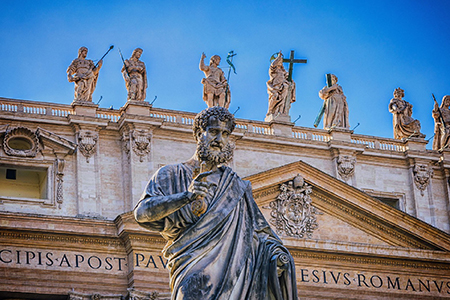“I will place the key of the House of David on Eliakim's shoulder; when he opens, no one shall shut, when he shuts, no one shall open” (Is 22:22).
“I will give you the keys to the kingdom of heaven. Whatever you bind on earth shall be bound in heaven; and whatever you loose on earth shall be loosed in heaven” (Mt 16:19).
I was dumbfounded when the above two verses from Isaiah and Matthew respectively were first paired up for comparison and the deeper meanings revealed by Dr. Scott Hahn in one of his earlier cassette-tape series on biblical studies. Born a rebel who customarily disliked any establishments and institutions, particularly the Catholic Church, I found Dr. Hahn’s comparison and insights fascinating and convincing.
Through Isaiah’s prophecy, God promises to give “the key of the House of David” to Eliakim, which signifies authority and power. He will represent the king and act as his governor or prime minister, if you will, governing the kingdom of David. More importantly, the authority given to Eliakim is complete and unreserved: “when he opens, no one shall shut, when he shuts, no one shall open”.
What is really striking is that Isaiah’s prophetic words that made Eliakim the leader governing the kingdom of David on behalf of the king were adopted almost word by word by Jesus when he made Peter (originally named “Simon”) the first leader of his Church, which is already the seed and the beginning of the kingdom of God on earth (LG 5). In response to Simon Peter’s confession that he was “the Christ, the Son of the living God”, Jesus said, “I will give you [Peter] the keys to the kingdom of heaven. Whatever you bind on earth shall be bound in heaven; and whatever you loose on earth shall be loosed in heaven” (Mt 16:19).
By adopting Isaiah’s prophetic words intentionally, Jesus is making three very significant points:
1. Jesus makes Peter the Sovereign Pontiff of his Church - Just as God made Eliakim the representative and governor of the kingdom of David by giving him the key of the house of David, he is making Simon Peter the vicar of his Church on earth by giving him the keys to the kingdom of heaven. As the Church on earth is already the seed and the beginning of that kingdom, Peter represents Jesus to govern his kingdom of heaven here on earth (LG 5). This is what the Catholics mean when they say the Church of Christ is Petrine.
2. The Sovereign Pontiff’s authority over the Church is complete and unrestrained - Just as Eliakim’s governing authority was complete and unrestricted – “when he opens, no one shall shut, when he shuts, no one shall open” – the governing authority of Peter and his successors is also complete and unrestricted. Thus: “Whatever you bind on earth shall be bound in heaven; and whatever you loose on earth shall be loosed in heaven”.
3. The Church is built on Peter and his successors - “And so I say to you, you are Peter, and upon this rock I will build my church” (Mt 16:18). In response to Simon calling him “Christos” (in Greek, which means “Messiah”), Jesus calls Simon “Petros” (in Greek, which means “rock”) (16:16,18). The pun – “Christos” and “Petros” – is not incidental; it is a powerful way to make clear Jesus’ intention to build his Church on the person of Peter, the leader of the 12 apostles; the person he is addressing directly and for whom he has just given a new name. It’s “on this rock” - on this “petra” (the word for a physical object in Greek, same meaning as “Petros” which refers to a person) - that he will build his Church.
As I studied this topic more and more, I found myself captivated by the magisterial position of the Catholic Church that the only divinely instituted “Church of Christ, which in the Creed we profess to be one, holy, catholic and apostolic, was entrusted [by Christ] to Peter’s pastoral care [and] is governed by the successor of Peter and by the bishops in communion with him” (LG 8). The stunning realization transformed me miraculously, turning me from a “Church rebel” into a passionate “Church defender”.
Little did I know that this change in me, drastic and unbelievable as it was, was only the beginning of a spiritual conversion of epic proportions. When it was all said and done, my world view, moral values, and personal life, particularly my marriage and family, had gone through a clear break with the past. It’s fair to say, the world as I knew it had turned completely upside down. And it’s all for good. For the first time, I truly understood what St. Peter meant when he said, “For you had gone astray like sheep, but you have now returned to the shepherd and guardian of your souls” (1 Peter 2:25). If my first encounter with the Isaiah 22:22 vs. Matthew 16:19 comparison was like a hurricane that shook me to the core of my being, the full force of its tailwinds can still be felt on encountering it again in this Sunday’s readings so many years later.
